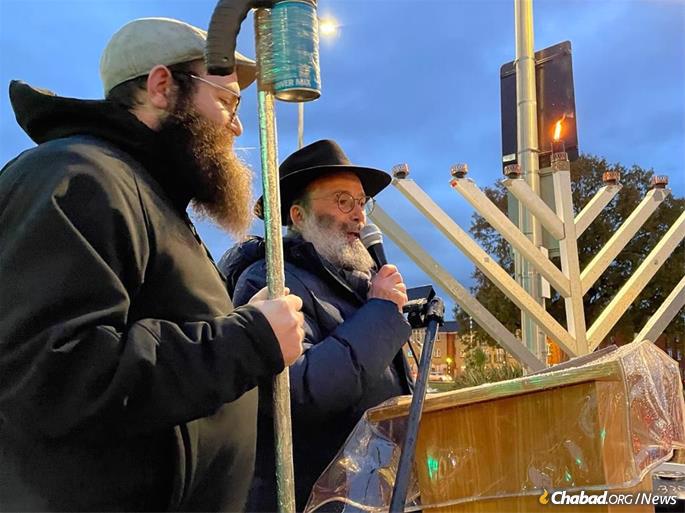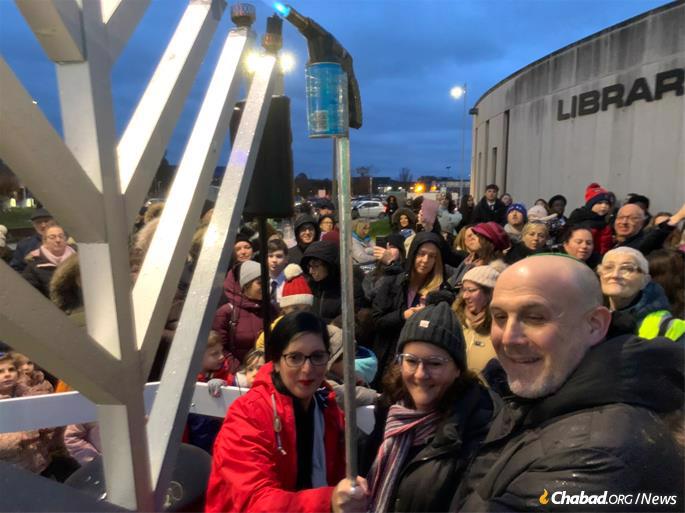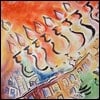A sense of perseverance in Jewish communities around the world in the face of war in Israel and antisemitism at home has led to a surge in public Chanukah displays and Jewish pride this year, a trend that was highlighted by the cancellation of Chabad’s public menorah-lighting at a festival in Williamsburg, Va. Festival organizers had claimed that the menorah sent a political message.
As a result, it was relocated to the campus of the College of William & Mary, where on Dec. 8, an unprecedented 300 people attended lighting to celebrate Chanukah.
““It was all a message of light, unity, pride, courage and who we are,” said Rabbi Mendy Heber, director of Chabad-Lubavitch of Williamsburg, which serves the area’s Jewish community and Jewish students at William & Mary, and which sponsored the menorah-lighting. “We are not ashamed to be Jewish, and we will do everything that we need to practice our religion and faith,” he told Chabad.org.
Heber noted that many non-Jewish friends and neighbors attended the event to show support for the Jewish people during difficult times.
“It was absolutely beautiful,” said Gabriel Stein, a freshman at William & Mary and a Chabad student group board member. “It got the community together, and it wasn’t just Jews there. It was people of all different faiths supporting the Jewish community, supporting the holiday. It’s about light and happiness, and simply, perseverance.”
That resolve was on full display in Virginia after the Second Sundays Art and Music Festival canceled the menorah-lighting, which had initially been scheduled for Dec. 10, sparking accusations of discrimination. “Unfortunately, they rejected us because they felt that because of the war in Israel, they would be seemingly choosing a side,” Heber said.
Festival organizers set an impossible condition for displaying the giant menorah, Heber said. They could have the menorah-lighting if it’s done under a banner calling for a “ceasefire.”
“We would have had to put up a political statement for something that wasn’t political, nor was it intended to be,” Stein said. “That drew the line, and we said, ‘absolutely not.’ ”

The menorah-lighting, now relocated to campus, was celebrated on Friday afternoon with refreshments, music and words of inspiration in the spirit of Chanukah. The lighting, which was co-sponsored by Chabad, Hillel and AEPi, was followed by a Chanukah party for students on Friday night and a holiday parade on Sunday.
The celebration on campus was a reminder of the ancient story of Chanukah, said Stein: “The resilience of the Jewish people to continue to practice and continue to be proud. I think that’s what we were able to do here. And I’m very proud to say that.”
The campaign to publicize the miracle and observance of Chanukah was initiated by the Rebbe—Rabbi Menachem Schneerson, of righteous memory—50 years ago, in 1973.


Cancelation Reversed in Great Britain
In a similar situation in Havering, a suburb of London. The town council canceled the installation of a menorah on city hall grounds. But there, it was reinstated after a meeting with concerned Jewish community leaders.
The town council had cited “escalating tensions from the conflict in the Middle East” and “the risk of further inflaming tensions within our communities” as the reason a menorah could not be installed.
The Muslim Association of Britain said in a statement it was “incredibly concerned” by the move and described it as “offensive to our Jewish brothers and sisters.” It offered to help steward events for Chanukah and provide extra security, if needed.

They said they would “stand shoulder to shoulder with British Jews in the face of the scourge of antisemitism,” Sufrin said.
Rabbi Aryeh Sufrin, executive director of Chabad North London & Essex, which erects the menorah, said the meeting with council leader Ray Morgan was positive. “He carefully listened to us and came to the conclusion that we would all continue with our original plans,” said Sufrin.
A few days later, an unusually large and festive crowd gathered in rainy weather for the Havering menorah-lighting on the first night of Chanukah.
Overcoming adversity is at the heart of the Chanukah story. Said Heber, echoing the Rebbe’s message regarding the Chanukah lights: “A little bit of light dispels a tremendous amount of darkness.”









Start a Discussion